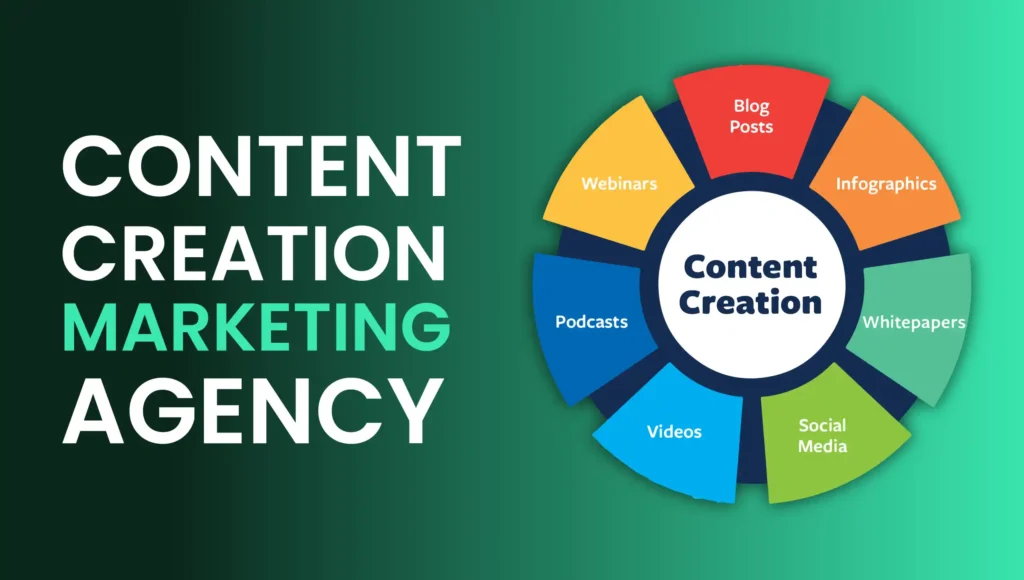How to start a content creation agency? It is a combination of strategic planning and hands-on experience. Based on my previous project, which involved a highly successful content creation effort for a small e-commerce business , I’ll outline the process of starting your very own agency and what those steps and their potential outcomes would look like based on my firsthand experience.
A marketing content creation agency specializes in crafting high-quality blogs, social media posts, and SEO-driven articles to enhance brand visibility. A digital marketing agency content creation strategy should focus on engaging storytelling, keyword optimization, and visually appealing graphics to attract the target audience.
Step 1: Identify Your Niche And Target Market
On my previous project, I collaborated with a small e-commerce brand that specialized in eco-friendly products. We created specialized content for an audience that cares about sustainability. So this deep focus on a niche had to be for the business to work on that project. When I started my content agency, I took the same approach and began making content for audiences in a handful of high-value industries, such as e-commerce and health & wellness, where content was an opportunity to keep audiences engaged and loyal.
Finding a niche enabled me to produce more relevant content for a smaller audience, resulting in better engagement and better marketing for clients. This began to establish some authority early on for the agency.
Result: Through identifying these industries, my agency could offer its skills to businesses in the sector looking for the right content strategies.
Step 2: Create Your Business Plan
Before starting the agency, I had a concrete business plan. From my experience with this previous project, I was able to see what kinds of services businesses really needed the most—SEO blog posts, social media content, video production, etc. I organized the business plan around these core offerings, a scalable pricing model based on the value each service was providing to clients.
The project taught me that businesses sometimes required flexibility in pricing. I provided several pricing options, such as retainer and project-based, to accommodate the needs of different clients.
Result: The business plan helped to provide not just vision but also specific goals and milestones around client acquisition and revenue growth. It served as a guiding document in the early evolution of the agency.
Step 3: Build a Portfolio
My portfolio was a major selling factor when I started the agency. I turned to case studies using the results of the e-commerce project. For instance, demonstrating how blog content generated traffic to the website and led to sales was critical in gaining my first clients.
My first project gave me tangible, measurable results where I could create a portfolio demonstrating proven success. I provided discounted services to new clients in exchange for permission to display their projects in my portfolio.
Result: They can put a face to the name and also have a physical example of what the agency can provide. My portfolio was key to persuading potential clients of the agency’s capabilities.
Step 4: Establish Your Legal and Financial Structure
Years of freelancing had taught me that a proper legal and financial structure was essential for scaling. I created an LLC for my agency and discussed with an accountant how to set up a business bank account and track expenses and taxes. A lesson I learned from my e-commerce company, which showed me how crucial it is to have proper financial systems in place—so, after that, I took this step.
Freelancing, I had informal accounting, but an agent needed a more formal process. My first project proved the importance of managing finances right from the start.
Outcome: Establishing the legal and financial structure earlier on enabled me to effectively manage the agency’s funds, as well as providing legal protection as my client base increased.
Step 5: Build Your Team
I started out by myself, but as the agency’s client base increased, I quickly recognized that I would need to hire other people. I brought on freelance writers, designers, and video editors to help expand the agency’s services. Through the e-commerce project, I realized how much more I needed fellow professionals with different backgrounds who could help support other points in the content creation process.
I realized the value in working with specialists. On one hand, for the e-commerce platform, partnering with a freelance designer to create engaging visuals alongside the written content was crucial to the success of the brand.
Result: Hiring supported the agency in taking on more extensive projects and provided them with the capacity to deliver more services while meeting timelines even under crunch.
Step 6: also, You have to create your online presence
My experience in the e-commerce business told me how important the online presence is. SEO, social media marketing, and content drove traffic to the business website. These were the strategies I implemented to develop my agency’s online presence, being mindful of search engine optimization on our website as well as maintaining a consistent and engaging social media profile.
Well-targeted social media posts and SEO-optimized content lead to a substantial increase in visitor traffic for the e-commerce business. This outcome, therefore, demonstrated how crucial online presence is for business growth.
The agency then established a professional website and consistent social media channels, which helped attract potential clients and highlighted the agency’s expertise. It was instrumental in generating inbound leads.
Step 7: Marketing Services
Taking learnings from the e-commerce project, I invested in paid ads to promote my agency. I launched Google Ads and social media campaigns aimed at small businesses looking for content creation.To enhance brand awareness, we leveraged our skills as a social media content creation agency. Paid ads had a massive influence on sales in the e-com project, so I applied this knowledge to my own marketing campaigns
This knowledge was translated to my paid campaigns for my e-commerce project. And networking events and LinkedIn outreach very quickly became the best ways to get clients.
Result: The marketing strategies, along with word-of-mouth referrals, enabled the agency to acquire its first clients rapidly and position itself in the market.
Step 8: Nurture Your Client Relationships
The e-commerce project drove further home the priority of client relationships. I always kept communication lines open, made sure we delivered results, and sought out feedback often. It was critical to building trust and keeping clients long-term. At my agency, I implemented this principle on how every client felt valued and heard on each project.
But e-commerce was better; one of the most valuable lessons we learned during the project was how much the clients valued transparency and communication. They were more inclined to work together and offer helpful suggestions.
Second, they learned not to sacrifice long-term success for short-term gratification: they focused on positive client outcomes, retaining and cultivating strong relationships, leading to referrals, and eventually sustainable long-term growth.
Step 9: Track Results and Continuously Improve
For the e-commerce company, I used analytics tools to constantly monitor the effectiveness of our content initiatives, measuring for engagement, sales, and ROI. This information helped us to adjust our strategy and enhance results. I followed this approach at my agency, leaning on performance data to inform the content development process and iterate on strategies.
In the e-commerce project, we used A/B testing and tracking to determine the pieces of content that converted the most. This same data-driven approach also worked in my agency, where measurable results proved ROI.
Achieving results: By tracking performance continuously, I was able to show my clients the value I added through services, optimize content strategies, and adapt my agency to this dynamic world.
Best content creation marketing agency—Why Choose?
Choosing the right content creation marketing agency is crucial for businesses looking to scale. Here’s how and why our approach works:
Machine Learning Expert in Multi-Channel Content Marketing
With 10+ years of experience behind us, we are the best at platform-oriented content for different audience segments.
Data-Driven Strategy
We don’t rely on guesswork. All content decisions are research, analytics, and performance based.
SEO Mastery
While some agencies bypass this process by creating content without the search factor, our approach guarantees you a natural feature through intelligent keyword placement at the heart of your content.
Conversion-Focused Content
It’s to turn eyeballs visiting your website into loyal subscribers by writing maximum high-ticket sales letters that are difficult to resist.
Summary Innovative & Adaptive Approach
The Internet changes by the second. We are one of the leading marketing content creation agencies and keep updating our strategies based on trends, algorithm changes, and audience behavior.
Conclusion
A successful content marketing strategy is not just about producing content—it’s about creating content that converts, engages, and establishes authority. With that newfound skill set, I leveraged the lessons learned and helpful experience from my first project (a highly successful content creation effort for an e-commerce business) to start a content agency, this time focused on eco-conscious brands and health & wellness businesses. Every aspect, from defining the niche to tracking results, had personalized lessons from my previous project. Things started to fall into place as the agency expanded, with key results including a diverse portfolio, tailored offerings, client retention, and a focus on constant content optimization, all leading to the agency thriving in a competitive market.
FAQ:
What is a content creation agency?
A content creation agency specializes in producing digital content such as blog posts, videos, social media content, and graphics to help businesses engage their audience and boost their online presence.
What is content creation marketing?
Content creation marketing is the process of developing valuable and relevant content to attract, engage, and convert potential customers. It includes blogs, videos, social media posts, and more to drive brand awareness and sales.
What is a content marketing company?
A content marketing company helps businesses plan, create, and distribute content strategically to reach their target audience. They focus on SEO, storytelling, and analytics to maximize engagement and conversions.
What are creative marketing agencies?
Creative marketing agencies provide innovative advertising and branding solutions. They focus on unique storytelling, graphic design, video production, and digital marketing to make brands stand out.
How does content creation pay?
Content creation earnings vary based on experience, platform, and niche. Creators can make money through brand partnerships, ad revenue, sponsorships, freelancing, or selling digital products and courses.
Is content creator a real job?
Yes, content creation is a legitimate career. Many professionals earn full-time incomes by producing and monetizing content on platforms like YouTube, Instagram, TikTok, and blogs.


